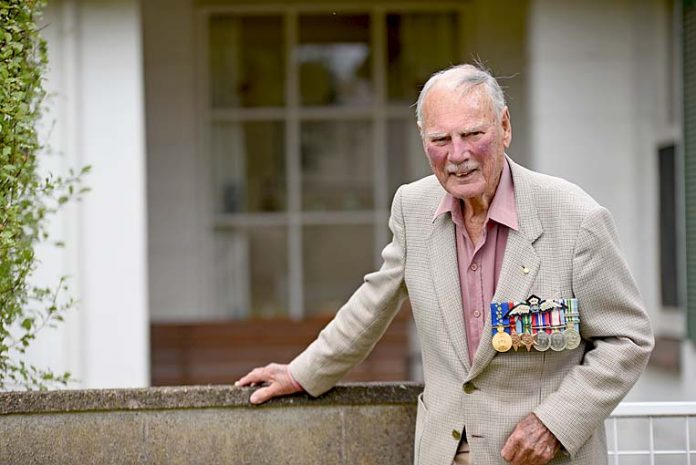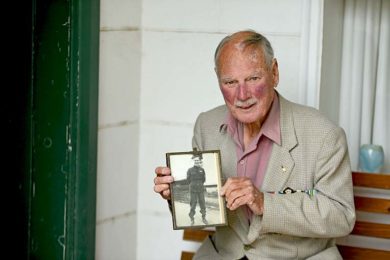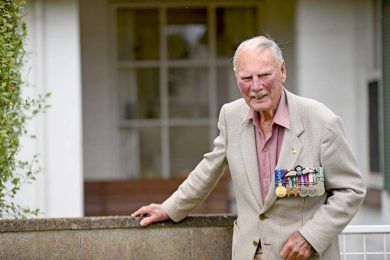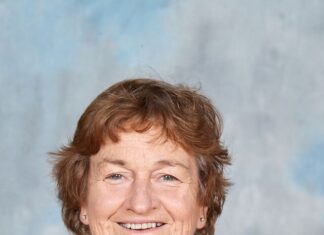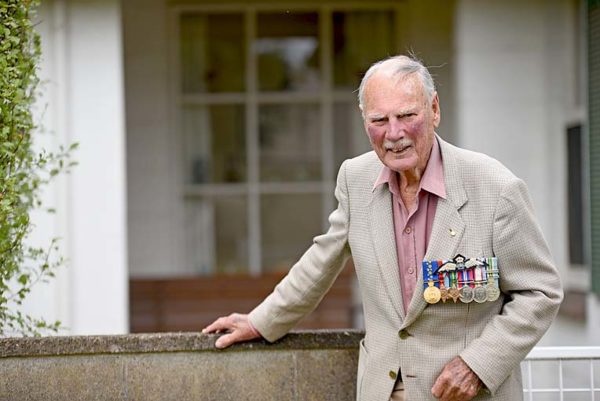
Picture: SANDRA MORELLO
WORLD War II veteran Charlie Miller thought he had seen it all during his extraordinary life.
The 96-year-old never imaged Anzac Day events, etched deeply into the nation’s psyche, would be cancelled due to a global enemy – the coronavirus.
The former Spitfire pilot will not join his comrades in an Anzac Day march tomorrow, a ritual he has done since returning from the war.
Mr Miller will not hear the haunting sounds of the lone-bugler as dawn breaks over the Vansittart Park Soldiers’ Memorial.
Neither will the celebrated war veteran share a glass or two of wine with his comrades at the Mount Gambier Community RSL.
Initially planning to ride his gopher in the iconic street march, he will instead spend this sacred day sitting on his front porch in his leafy quiet street.
“I loved walking along Commercial Street in the Anzac Day march to the applause of so many people and particularly the waves from little children,” Mr Miller told The Border Watch ahead of Anzac Day.
The celebrated veteran has attended Anzac Day events every year since 1946.
“I cannot ever remembering Anzac Day events being cancelled,” Mr Miller said.
Mr Miller has been regular face at the poignant dawn service as well as the intimate gathering at the airmen’s graves at the Lake Terrace Cemetery.
As his war medals glistened in the autumn sunshine, he conceded Anzac Day tomorrow will be “absolutely different”.
“Anzac Day is so built into our lifestyle. My father was an original Anzac in World War I, he was in the Light Horse at Gallipoli. Fortunately, he came home from the war,” Mr Miller revealed.
He suggested he may share a glass of wine tomorrow with his neighbour, as long as they follow strict social distancing rules.
“At a certain time, I know he will be there with a bottle of wine.”
For Mr Miller, it does not matter how people commemorate the day as long as they remember the fallen and those who fought in all theatres of war.
“We must remember the poor fellows who did not come back and their families.”
While admitting he was slowing down due to his growing frailty, Mr Miller hopes to see a few more Anzac Days.
“I want to catch up to the number attended by my friend Jack Hopgood, I am four years behind Jack in age. We are really the only two World War II fellows left in Mount Gambier.”
Conceding Anzac Day was a time for reflection and a roller-coaster of emotions, he said it was important to remember people who fought in battlefields, jungles and in the skies for freedom.
While describing his wartime experience as adventurous, he said it was also marked with great peril and tragedy.
“As a fighter pilot, we were all young fellows teasing each other and getting the most out of life,” Mr Miller said.
Reminiscing about his service, he revealed memories flying over Borneo jungles had yet to fade.
“It does not feel that long ago. I can remember most of the names of the fellows I was with. It took such a part of my life,” the war veteran added.
“When we went up, we did not know if we would come back. Spitfires were used for strafing – this was a dangerous game.
“You could misjudge going in and diving and there were machine guns going. If you misjudged the height by a few feet, you could crash into a tree in the jungle.
“Our mission was to destroy Japanese camps of soldiers. We would be told there were Japanese in an area and we would have to find them. This is bloody hard given it was jungle.”
He conceded Spitfire pilots needed to have nerves of steel given they were at the frontline of aerial missions and attacked Japanese strongholds.
“When you were told to do it, a flight of four aircraft would go in – sometimes not all of us would return.
“I originally listed for the thrills, but of course it was dangerous. I got my wings and for a while I was made a flying instructor.”
Sadly, Mr Miller witnessed heartbreaking accidents where young pilots died in their “prime of life”.
“I can always remember one fellow who was tall and handsome who was killed in an accident. Instructors would always go to the funeral in a symbol of recognition,” he recalled.
“I can distinctly remember his father and mother being there. His father was a lieutenant in the army and his mother was an elegant woman. They lost their son – I shed a few tears that day thinking my mother and father could suffer the same.”
Regarding the COVID-19 pandemic, he conceded the “world was changing”.
“The world is getting bigger and wider. It is extraordinary a virus can come here in next to no time and it is now around the world,” Mr Miller said.
Mr Miller conceded the self-isolation and the lack of visitors were taking a toll on him.
“But I have wonderful neighbours who help me,” he said.
“I go down to the post office on my gopher to get the mail, but I will not speak with too many people.
“I used to love going down there, you would always meet someone there and have a chat.”

